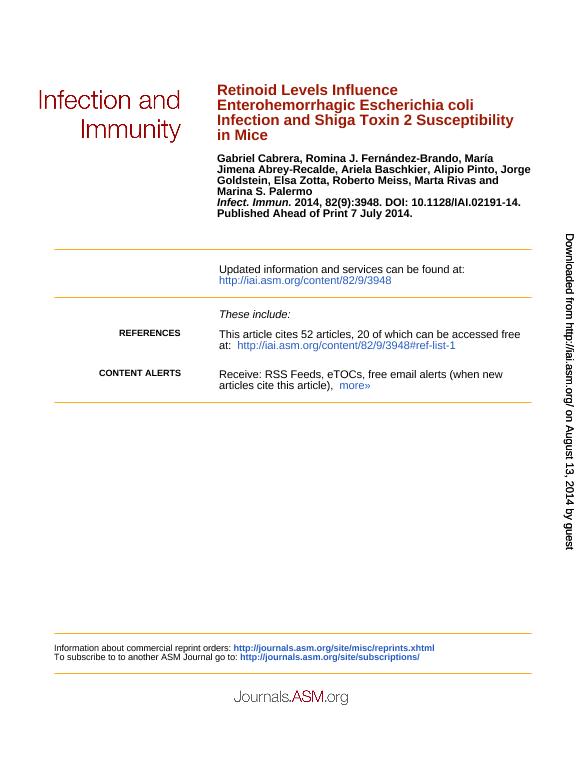Artículo
Retinoid levels influence enterohemorrhagic Escherichia coli infection and shiga toxin susceptibility in mice
Cabrera, Gabriel Gustavo ; Fernández Brando, Romina Jimena
; Fernández Brando, Romina Jimena ; Abrey Recalde, Maria Jimena
; Abrey Recalde, Maria Jimena ; Baschkier, Ariela; Vasconcelos Esteves Pinto, Alipio
; Baschkier, Ariela; Vasconcelos Esteves Pinto, Alipio ; Goldstein Raij, Jorge
; Goldstein Raij, Jorge ; Zotta, Elsa; Meiss, Roberto; Rivas, Marta; Palermo, Marina Sandra
; Zotta, Elsa; Meiss, Roberto; Rivas, Marta; Palermo, Marina Sandra
 ; Fernández Brando, Romina Jimena
; Fernández Brando, Romina Jimena ; Abrey Recalde, Maria Jimena
; Abrey Recalde, Maria Jimena ; Baschkier, Ariela; Vasconcelos Esteves Pinto, Alipio
; Baschkier, Ariela; Vasconcelos Esteves Pinto, Alipio ; Goldstein Raij, Jorge
; Goldstein Raij, Jorge ; Zotta, Elsa; Meiss, Roberto; Rivas, Marta; Palermo, Marina Sandra
; Zotta, Elsa; Meiss, Roberto; Rivas, Marta; Palermo, Marina Sandra
Fecha de publicación:
09/2014
Editorial:
American Society for Microbiology
Revista:
Infection and Immunity
ISSN:
0019-9567
Idioma:
Inglés
Tipo de recurso:
Artículo publicado
Clasificación temática:
Resumen
Enterohemorrhagic Escherichia coli (EHEC) is a food-borne pathogen that produces Shiga toxin (Stx) and causes hemorrhagic colitis. Under some circumstances, Stx produced within the intestinal tract enters the bloodstream, leading to systemic complications that may cause the potentially fatal hemolytic-uremic syndrome. Although retinoids like vitamin A (VA) and retinoic acid (RA) are beneficial to gut integrity and the immune system, the effect of VA supplementation on gastrointestinal infections of different etiologies has been controversial. Thus, the aim of this work was to study the influence of different VA status on the outcome of an EHEC intestinal infection in mice. We report that VA deficiency worsened the intestinal damage during EHEC infection but simultaneously improved survival. Since death is associated mainly with Stx toxicity, Stx was intravenously inoculated to analyze whether retinoid levels affect Stx susceptibility. Interestingly, while VA-deficient (VA-D) mice were resistant to a lethal dose of Stx2, RA-supplemented mice were more susceptible to it. Given that peripheral blood polymorphonuclear cells (PMNs) are known to potentiate Stx2 toxicity, we studied the influence of retinoid levels on the absolute number and function of PMNs. We found that VA-D mice had decreased PMN numbers and a diminished capacity to produce reactive oxygen species, while RA supplementation had the opposite effect. These results are in line with the well-known function of retinoids in maintaining the homeostasis of the gut but support the idea that they have a proinflammatory effect by acting, in part, on the PMN population.
Archivos asociados
Licencia
Identificadores
Colecciones
Articulos(CCT - SANTA FE)
Articulos de CTRO.CIENTIFICO TECNOL.CONICET - SANTA FE
Articulos de CTRO.CIENTIFICO TECNOL.CONICET - SANTA FE
Articulos(IFIBIO HOUSSAY)
Articulos de INSTITUTO DE FISIOLOGIA Y BIOFISICA BERNARDO HOUSSAY
Articulos de INSTITUTO DE FISIOLOGIA Y BIOFISICA BERNARDO HOUSSAY
Citación
Cabrera, Gabriel Gustavo; Fernández Brando, Romina Jimena; Abrey Recalde, Maria Jimena; Baschkier, Ariela; Vasconcelos Esteves Pinto, Alipio; et al.; Retinoid levels influence enterohemorrhagic Escherichia coli infection and shiga toxin susceptibility in mice; American Society for Microbiology; Infection and Immunity; 82; 9; 9-2014; 3948-3957
Compartir
Altmétricas



